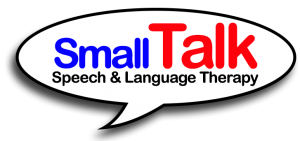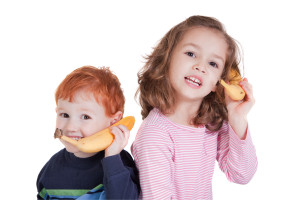Language
What do we mean by “language”?
What can receptive language difficulties look like?
What can expressive language difficulties look like?
What causes language difficulties?
What can I do to help?
What do we mean by “language”?
“Language” consists of two elements: receptive language and expressive language. Children can experience difficulty with both receptive and expressive language, or there may be a difficulty in just one of these areas.
Receptive language
Receptive language is our ability to understand what is said to us. When someone asks us a question, gives an instruction or explains something, we need to understand the specific words and sentences they use in order to respond appropriately. As children’s language skills develop they learn to understand:
- words (e.g. they learn that “bath time” means they are about to get wet, “get dressed” means they are about to put clothes on).
- linguistic concepts (e.g. big/little, hot/cold, up/down, same/different etc).
- questions, such as “What’s that?” “What are you doing?”, “Who?”, “Where?”, “Why” and “When?” and learn that when asked these questions they are expected to respond.
- instructions (e.g. “Go and get your shoes”).
Receptive language also involves attention (concentration) and memory. If children have difficulty concentrating for a period of time this will affect how much new information they are able to take in. Similarly, children with memory problems will find it hard to retain newly learnt information and will often need to hear something many times before they have really “learnt” it.
What can receptive language difficulties look like?
Young children with receptive language difficulties may find it hard to:
- identify specific objects and pictures (i.e. know what things are called)
- follow instructions (they may benefit from gestures such as pointing to help them understand)
- answer questions – they may repeat back what is said to them rather than answering (echolalia)
- take turns when talking with others
- understand more complex sentences
- concentrate for longer periods of time, especially in situations where there is a lot of talking involved
- make and keep friends
- listen during story time
School aged children with receptive language problems may also have difficulty:
- processing information presented verbally without visuals
- waiting for an instruction to be finished and may seem impulsive
- following an activity and may appear ‘lost’
- answering questions e.g. ‘who, what, when, where, why?’
- with reading comprehension (understanding what they have read)
- following the content of a conversation accurately and may talk‘off topic’as a result
- learning new concepts
Expressive language
Expressive language is our ability to get our message across through talking. It doesn’t refer to pronunciation of words or how we say the words – this is known as “speech” or “articulation”.
Good expressive language skills involve:
- having a wide vocabulary of specific words
- putting words together in the right order to form sentences
- using age appropriate grammar (e.g.” He went to school” rather than “Him goed to school”)
- being able to put events into the right sequence to tell a story
What can expressive language difficulties look like?
Young children with expressive language difficulties may find it hard to:
- use the specific names of objects or actions. Sometimes they may use jargon (made up words or babble) instead of, or in addition to, real words
- put words together to make short sentences
- use correct grammar (e.g. confusing “he/she”, “him/her”, difficulty using words such as “is/are”, past tense or plurals)
- retelling a story or describing an event
School aged children with expressive language problems may also have difficulty:
- finding the most appropriate or specific word to use
- using more than just simple sentences
- explaining what they mean
- writing stories or other text types
What causes language difficulties?
In most cases we don’t know why some children have language difficulties. Some possible reasons are:
- hearing difficulties, including ongoing ear infections
- general developmental delay
- learning difficulties
- having developmental differences or syndrome in which language delay is a typical feature
- being born premature
- brain injury
Many children’s language difficulties cannot be explained by any of the above. These children are generally diagnosed with a “developmental language delay/disorder”, which simply means a language delay that cannot be explained by any other underlying condition.
What can I do to help?
- Check out the ages and stages information provided. Language skills develop differently from child to child, however the information here is a guide to what children are generally able to do at various ages.
- If your child is not meeting these milestones, the first step is to get their hearing checked. Even if they seem to hear fine, kids are experts at picking up on visual cues to get by. It’s important to catch hearing loss early, so that intervention begins as soon as possible.
- Be interested in what your child has to say. This shows you love them and encourages them to keep talking.
- Speak in short, simple sentences. This will help your child understand what you say, but it will also make it easier for them to copy your words and learn from them.
- Expand on what your child says, e.g. if your child says “Dog” then you could say “Pat the dog” or “Brown dog” or “The dog is drinking”.
- Give your child plenty of time to respond. Remember, children are still learning language so aren’t always able to respond as quickly as adults do. It helps to give them extra time to think about what they want to say and the words they need
- Talk to your child often such as when you’re out walking, visiting the park or at bath time, but make sure you give opportunities for your child to talk too.
- Read books with your little one – regardless of their age.
- Sing songs with your baby or preschooler. The repetitive nature of songs especially when paired with relevant actions can really help your child to learn new words. Click here to get the words to popular children’s songs.
- Try to make sure your child is looking at you when you are talking to them. You might call their name, then wait for them to look at you before continuing with what you want to say.
- Talk about things and activities which your child is interested in.
- Use gestures, facial expression and intonation to help your child understand and become engaged in the interaction.
- Remember that children with language difficulties are not being lazy!
I’m worried – what should I do?
Don’t wait. Research shows much better outcomes – both immediate and in the future – when intervention begins early on. Assessment by a speech pathologist will tell you if there is likely nothing to worry about or if there is some difficulty. If your child does have a language delay the speech pathologist may recommend therapy. This would involve the speech pathologist working together with you and your child, providing ideas and resources and many more things you can do to help your child develop language. Remember – parents don’t cause language delays, but a parent with great support and advice can help their child to overcome their difficulties.
Hornsby, Hornsby Heights, Asquith, Mount Colah, Mount Kuring-gai, Mt Kuring-gai, Berowra, Waitara, Wahroonga, Warrawee, Normanhurst, Thornleigh, Westleigh, Pennant Hills


